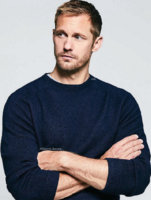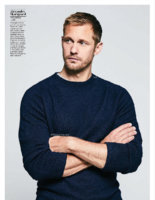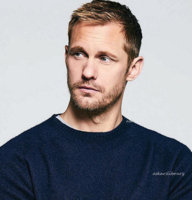BILL: Well, my first film was with you.
ALEXANDER: Oh, yeah. I didn’t want to say it, but I got you into this business. I can take you out of it. [laughs]
BILL: I would never have been here if it wasn’t for the role of Klasse in White Water Fury. I was the only kid on set, and I remember I got upset for some reason. Do you remember the story? I ran away from set or something?
ALEXANDER: Oh, I remember what it was. The fruit basket in your trailer wasn’t fresh enough. And they got Evian instead of Perrier, so you stormed off and called your agent.
BILL: [laughs] At 9 years old.
ALEXANDER: You called your agent-slash-kindergarten teacher. I don’t remember you being upset, but I do have a very vivid memory where you wrapped early one day, and they took you back to the hotel, and I had another scene. When I got back, you were just standing outside in the parking lot, waiting for me, and it broke my heart. It was just the two of us. We obviously come from a big family back in Stockholm. I never felt needed. It was always chaos with Mom, Dad, uncles, you know, we all lived in the same building. Dinner parties with 25 people every night. And for the first time, you and I went away together, and suddenly I wasn’t just a big brother. I felt paternal. You were just standing in the parking lot waiting for your big brother to come home, because you didn’t know anyone and you didn’t know what to do. If I ever need a little sense memory for a scene, that vision of coming around the corner and seeing you standing there, this little boy in this massive parking lot, is really beautiful and heartbreaking. It was the first time I ever felt needed.
BILL: That’s a lovely story.
ALEXANDER: We come from a family of musicians, artists, authors, creative people, and the only exception is our mom and one of our brothers—they’re doctors. How often do you brag about them at dinner parties?
BILL: There’s definitely a sense of embarrassment about what it is artists really do, at least for me in terms of acting. We have a mom and a brother who literally save lives.
ALEXANDER: He works at an ICU so he, on a daily basis, saves lives. Do you have a sense of guilt because he works his ass off and makes less money than you?
BILL: Yeah, of course. It’s not fair. I’m constantly embarrassed at the level of attention actors get and the level of money that we get. It’s completely disproportionate. I think you have to feel guilty about it. I think it makes you a better person to keep reminding yourself.
ALEXANDER: Your becoming an actor—was that the path of least resistance or was it a calling?
BILL: All thanks to you for blessing me with the part of Klasse in White Water Fury.
ALEXANDER: You’re welcome. You might want to remind yourself of that more often, but I do appreciate it.
BILL: I started acting when I was 9. I did smaller parts here and there as a kid, and then as I grew older I started resisting it, because I didn’t like the idea of being, at the time, number four of the Skarsgård actors—Dad, you, and our brother Gustaf. So in high school I majored in science and was like, “Maybe I’ll do something rebellious and become a doctor.” [laughs]
ALEXANDER: Did you seriously entertain that idea?
BILL: I don’t think I would ever be a doctor, but the reason I majored in science was because you could become a civil engineer, you could become a biologist, you could become a computer scientist—that was the point of it. I had no idea what I wanted to do. In my last two years of high school—because they would still reach out to me for auditions and I would read scripts—there happened to be these few scripts that I really responded to. One in particular that I read, I was like, “Oh, this is a real character. This is amazing.” I was like, “I really, really want to do this.” It was Hannes Holm’s film, and I saw him at a premiere—I was, like, 19 at the time, I had probably been to three or four auditions, but I wasn’t cast or anything—and I went up to him and was like, “I don’t know what I need to do, but I need to be in your film.” Eventually, I landed the job, and that was something that I felt transcended whatever other people would think of me.
ALEXANDER: Do you believe you’re a good actor? Do you think you deserve to be here because of your talent?
BILL: 100 percent.
ALEXANDER: Do you ever feel like a **** actor?
BILL: 100 percent. I feel like I’m the best actor on the planet and I also feel like I’m a fraud.
ALEXANDER: Simultaneously, or does it fluctuate?
BILL: They’re kind of simultaneous. I think hubris comes from insecurity. Confidence comes in a more rooted sense; part of being confident is being able to say, “I can be really ****ty,” and to accept that. But also not to crumble under it.
ALEXANDER: So, the official It trailer has been viewed over 197 million times. It set a record for the most online views in a single day, when it launched. Why? Do we just fear clowns that much?
BILL: I think it’s huge for an older generation. Do you remember the original?
ALEXANDER: I never saw the original.
BILL: But did people talk about it in school?
ALEXANDER: Yeah.
BILL: I remember It being the scariest thing that existed for a kid. There were other horror films, like Friday the 13th or Halloween, but this was the really scary one because it was children and a clown. So many people go, “That film really destroyed my childhood,” or, “I hated clowns after that.” Hopefully, there will be a lot of 10-year-olds who will be traumatized forever based on my performance. [laughs]
ALEXANDER: Is it R-rated?
BILL: It probably will be, yeah.
ALEXANDER: So those 10-year-old kids won’t be able to see it then.
BILL: Well, no, but—
ALEXANDER: They’ll still be traumatized by the poster.
BILL: But not even that. The movies that they’re not allowed to see are the movies that they’re going to really want to see.
ALEXANDER: Does it feel good knowing that kids around the world for decades to come will have nightmares about you?
BILL: It’s a really weird thing to go, “If I succeed at doing what I’m trying to do with this character, I’ll traumatize kids.” On set, I wasn’t very friendly or goofy. I tried to maintain some sort of weirdness about the character, at least when I was in all the makeup. At one point, they set up this entire scene, and these kids come in, and none of them have seen me yet. Their parents have brought them in, these little extras, right? And then I come out as Pennywise, and these kids—young, normal kids—I saw the reaction that they had. Some of them were really intrigued, but some couldn’t look at me, and some were shaking. This one kid started crying. He started to cry and the director yelled, “Action!” And when they say “action,” I am completely in character. So some of these kids got terrified and started to cry in the middle of the take, and then I realized, “Holy ****. What am I doing? What is this? This is horrible.”
ALEXANDER: Was this your first interaction with a child where you realized how terrifying it would be for them?
BILL: Yeah. But then we cut, and obviously I was all, “Hey, I’m sorry. This is pretend.” [laughs]
ALEXANDER: Last question: Have you called Mom?
BILL: Um, I haven’t called her today, no.
ALEXANDER: No? Call Mom.
ALEXANDER SKARSGÅRD, WHO RECENTLY STARRED IN THE HBO SERIES BIG LITTLE LIES, WILL NEXT APPEAR IN DUNCAN JONES’S MUTE AND JEREMY SAULNIER’S HOLD THE DARK.
http://www.interviewmagazine.com/film/bill-skarsgard-1#_
ALEXANDER: Oh, yeah. I didn’t want to say it, but I got you into this business. I can take you out of it. [laughs]
BILL: I would never have been here if it wasn’t for the role of Klasse in White Water Fury. I was the only kid on set, and I remember I got upset for some reason. Do you remember the story? I ran away from set or something?
ALEXANDER: Oh, I remember what it was. The fruit basket in your trailer wasn’t fresh enough. And they got Evian instead of Perrier, so you stormed off and called your agent.
BILL: [laughs] At 9 years old.
ALEXANDER: You called your agent-slash-kindergarten teacher. I don’t remember you being upset, but I do have a very vivid memory where you wrapped early one day, and they took you back to the hotel, and I had another scene. When I got back, you were just standing outside in the parking lot, waiting for me, and it broke my heart. It was just the two of us. We obviously come from a big family back in Stockholm. I never felt needed. It was always chaos with Mom, Dad, uncles, you know, we all lived in the same building. Dinner parties with 25 people every night. And for the first time, you and I went away together, and suddenly I wasn’t just a big brother. I felt paternal. You were just standing in the parking lot waiting for your big brother to come home, because you didn’t know anyone and you didn’t know what to do. If I ever need a little sense memory for a scene, that vision of coming around the corner and seeing you standing there, this little boy in this massive parking lot, is really beautiful and heartbreaking. It was the first time I ever felt needed.
BILL: That’s a lovely story.
ALEXANDER: We come from a family of musicians, artists, authors, creative people, and the only exception is our mom and one of our brothers—they’re doctors. How often do you brag about them at dinner parties?
BILL: There’s definitely a sense of embarrassment about what it is artists really do, at least for me in terms of acting. We have a mom and a brother who literally save lives.
ALEXANDER: He works at an ICU so he, on a daily basis, saves lives. Do you have a sense of guilt because he works his ass off and makes less money than you?
BILL: Yeah, of course. It’s not fair. I’m constantly embarrassed at the level of attention actors get and the level of money that we get. It’s completely disproportionate. I think you have to feel guilty about it. I think it makes you a better person to keep reminding yourself.
ALEXANDER: Your becoming an actor—was that the path of least resistance or was it a calling?
BILL: All thanks to you for blessing me with the part of Klasse in White Water Fury.
ALEXANDER: You’re welcome. You might want to remind yourself of that more often, but I do appreciate it.
BILL: I started acting when I was 9. I did smaller parts here and there as a kid, and then as I grew older I started resisting it, because I didn’t like the idea of being, at the time, number four of the Skarsgård actors—Dad, you, and our brother Gustaf. So in high school I majored in science and was like, “Maybe I’ll do something rebellious and become a doctor.” [laughs]
ALEXANDER: Did you seriously entertain that idea?
BILL: I don’t think I would ever be a doctor, but the reason I majored in science was because you could become a civil engineer, you could become a biologist, you could become a computer scientist—that was the point of it. I had no idea what I wanted to do. In my last two years of high school—because they would still reach out to me for auditions and I would read scripts—there happened to be these few scripts that I really responded to. One in particular that I read, I was like, “Oh, this is a real character. This is amazing.” I was like, “I really, really want to do this.” It was Hannes Holm’s film, and I saw him at a premiere—I was, like, 19 at the time, I had probably been to three or four auditions, but I wasn’t cast or anything—and I went up to him and was like, “I don’t know what I need to do, but I need to be in your film.” Eventually, I landed the job, and that was something that I felt transcended whatever other people would think of me.
ALEXANDER: Do you believe you’re a good actor? Do you think you deserve to be here because of your talent?
BILL: 100 percent.
ALEXANDER: Do you ever feel like a **** actor?
BILL: 100 percent. I feel like I’m the best actor on the planet and I also feel like I’m a fraud.
ALEXANDER: Simultaneously, or does it fluctuate?
BILL: They’re kind of simultaneous. I think hubris comes from insecurity. Confidence comes in a more rooted sense; part of being confident is being able to say, “I can be really ****ty,” and to accept that. But also not to crumble under it.
ALEXANDER: So, the official It trailer has been viewed over 197 million times. It set a record for the most online views in a single day, when it launched. Why? Do we just fear clowns that much?
BILL: I think it’s huge for an older generation. Do you remember the original?
ALEXANDER: I never saw the original.
BILL: But did people talk about it in school?
ALEXANDER: Yeah.
BILL: I remember It being the scariest thing that existed for a kid. There were other horror films, like Friday the 13th or Halloween, but this was the really scary one because it was children and a clown. So many people go, “That film really destroyed my childhood,” or, “I hated clowns after that.” Hopefully, there will be a lot of 10-year-olds who will be traumatized forever based on my performance. [laughs]
ALEXANDER: Is it R-rated?
BILL: It probably will be, yeah.
ALEXANDER: So those 10-year-old kids won’t be able to see it then.
BILL: Well, no, but—
ALEXANDER: They’ll still be traumatized by the poster.
BILL: But not even that. The movies that they’re not allowed to see are the movies that they’re going to really want to see.
ALEXANDER: Does it feel good knowing that kids around the world for decades to come will have nightmares about you?
BILL: It’s a really weird thing to go, “If I succeed at doing what I’m trying to do with this character, I’ll traumatize kids.” On set, I wasn’t very friendly or goofy. I tried to maintain some sort of weirdness about the character, at least when I was in all the makeup. At one point, they set up this entire scene, and these kids come in, and none of them have seen me yet. Their parents have brought them in, these little extras, right? And then I come out as Pennywise, and these kids—young, normal kids—I saw the reaction that they had. Some of them were really intrigued, but some couldn’t look at me, and some were shaking. This one kid started crying. He started to cry and the director yelled, “Action!” And when they say “action,” I am completely in character. So some of these kids got terrified and started to cry in the middle of the take, and then I realized, “Holy ****. What am I doing? What is this? This is horrible.”
ALEXANDER: Was this your first interaction with a child where you realized how terrifying it would be for them?
BILL: Yeah. But then we cut, and obviously I was all, “Hey, I’m sorry. This is pretend.” [laughs]
ALEXANDER: Last question: Have you called Mom?
BILL: Um, I haven’t called her today, no.
ALEXANDER: No? Call Mom.
ALEXANDER SKARSGÅRD, WHO RECENTLY STARRED IN THE HBO SERIES BIG LITTLE LIES, WILL NEXT APPEAR IN DUNCAN JONES’S MUTE AND JEREMY SAULNIER’S HOLD THE DARK.
http://www.interviewmagazine.com/film/bill-skarsgard-1#_






